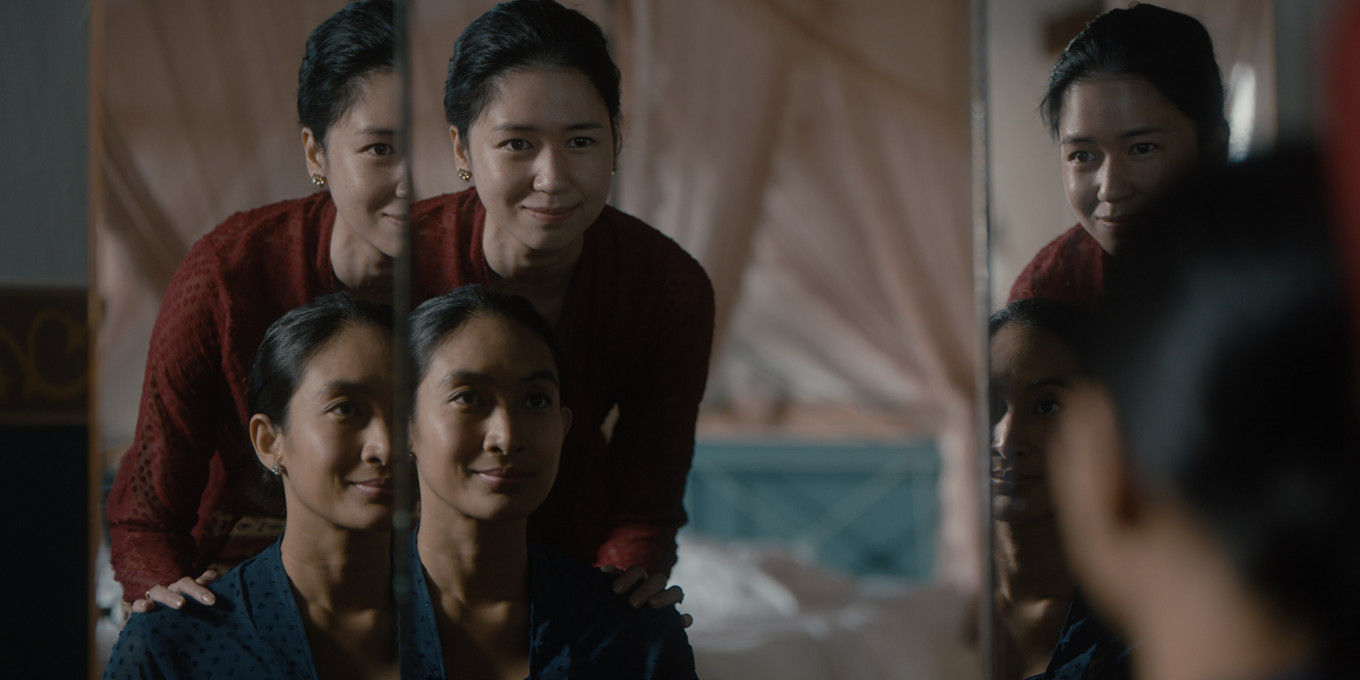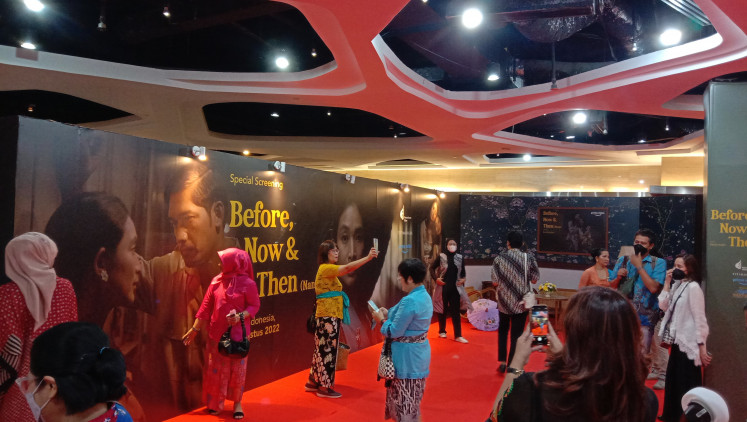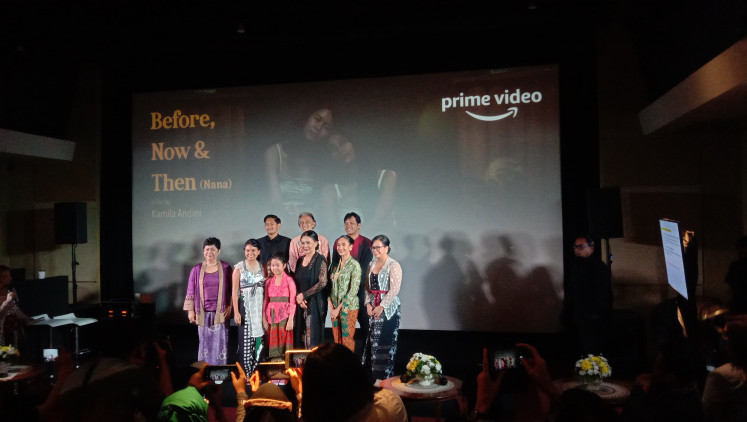Popular Reads
Top Results
Can't find what you're looking for?
View all search resultsPopular Reads
Top Results
Can't find what you're looking for?
View all search resultsAsian sentiments matter most for director Kamila Andini in ‘Before, Now & Then’
Change text size
Gift Premium Articles
to Anyone
I
n a special screening of her feature film Before, Now & Then (Nana), the cast and crew spoke of the struggle its female characters face.
There was nothing but smiles among the crowd on the sixth floor of the Plaza Indonesia mall, which had been made a venue for a red-carpet event on Aug. 18. Everyone was wearing kebaya (traditional blouses), formal batik or other traditional attire.
The occasion was a special one: a screening of one of the most beloved Indonesian feature films of the moment, Before, Now & Then (Nana), by award-winning Yuni director Kamila Andini. The movie was released on the Amazon Prime Video streaming service on Aug. 1 and became the number one movie on the platform in only 48 hours.
Based on a true story, Nana is an adaptation of a biography titled Jais Darga Namaku (Jais Darga Is My Name) written by Ahda Imran. It tells the story of Jais’ mother, Nana, and her struggle in her second marriage to an unfaithful husband, Darga, amid the political turmoil of the 1960s.
“This was filmed because I wanted to give a present to my mother who has raised me. A loving mother with all her strengths and weaknesses, a mother who knows what she wants,” Jais said during the media gathering on Aug. 18.
“I respect my mother. I didn't expect anything [from this movie] at first,” she said.
But the film went on to receive praise across the globe. Before, Now & Then (Nana) charmed audiences in its premiere at the Berlin International Film Festival, even winning the best supporting actress award thanks to Laura Basuki’s performance as Ino, Darga’s mistress in the movie.
Sundanese root
Director Kamila Andini has been known to infuse cultural aspects in her previous films, but she had yet to tap into her Sundanese roots—which make up her extended family—until now.
“This is probably a film where my intuition about sounds, textures, anything related to culture just flows easily [because] a lot of things in this film are my memories of my grandmother and grandfather at home, what they like to wear, what they like to do, what they listen to,” she told The Jakarta Post.
Set in Bandung during the 1960s, the film features lead actress Happy Salma, who was born and raised in Sukabumi, West Java, but still had to make sure she got the Sundanese language right.
“Sundanese in the 1960s turned out to be quite different from today,” Happy, who plays Nana in the movie, said at the media gathering. “The challenge was to see how close I was to my roots.”
Before, Now & Then (Nana) became the first film made by an Indonesian to use Sundanese exclusively, and it was announced by Indonesian World Records Museum (MURI) founder Jaya Suprana during the special screening that the movie had won a MURI record for doing so.
“We cooperated with the Sundanese language community from Bandung. They were present every day at the location next to my monitor,” said Andini, whose previous films have always incorporated regional languages.
Producer Ifa Isfansyah also noted that despite the older subject matter, Andini and the crew focused on making the movie look modern.
“From the beginning, we were very clear about making a film from the ‘60s [but that it] must still be apparent that it was made in the present time,” Ifa told the Post.
“That’s the interesting part: how to combine the visuals and feelings of the past but still maintain a contemporary feeling to it.”
Red carpet event: A look at the special screening of Kamila Andini's film 'Before, Now & Then (Nana)', which took up the sixth floor of the Plaza Indonesia mall on Aug. 18. (JP/Radhiyya Indra) (JP/Radhiyya Indra)Meditative stills
Unlike local blockbusters that push laughs (Ngeri-Ngeri Sedap) or jump scares (Satan Slaves 2), Before, Now & Then basks in silence instead. Nana’s internal struggle is barely uttered by herself. Only dreams and memories inform us about her long-lost first husband.
“The reason why film is a very fun medium for me is that all its elements tell a story. The story is not only seen from the script, dialogue and acting, but all elements must have their own plot,” Andini said.
And all these aspects are very much orchestrated by Andini with care, never exploiting Nana’s emotions nor letting go of every little nudge or turn of her head.
“I like stillness, I like to talk about things that are internal, so the orchestration of all those aspects plays a crucial part in talking about these things,” she said.
This silence and stillness eventually rested on the actors to execute, and everyone experienced the challenge.
“What I felt when I read the script for the first time was […] what will the end product be like?” Happy Salma said. “There wasn’t much dialogue. Only eye glances, all of them symbolic,” she added.
A lot of the scenes, Happy said, were very demanding.
“Speaking with your eyes, expressing yourself without sound, is not easy at all.”
Arswendy Bening Swara, who played Darga, Nana’s second husband, also mentioned how special the film’s meditative experience was.
“What differentiates this film from other films that I’ve played in is that this one is more of a reflection and it has a slower rhythm. It requires the audience’s patience,” said Arswendy, who has played in celebrated films such as Satan’s Slave, Two Blue Stripes and Ngeri-Ngeri Sedap.
“I'm not saying this is the most special film of all, but this film must be watched by a rather special audience, who seeks reflection, identification, not just entertainment.”
Special for the big screen: The cast and crew of the film 'Before, Now & Then' are pictured during a media gathering prior to the film's special screening in Plaza Indonesia's XXI movie theater in Jakarta. (JP/Radhiyya Indra) (JP/Radhiyya Indra)Love of Asian cinema
The end product is a picturesque depiction of two women’s rivalry turned friendship, as well as their longing for a better life beyond the country’s history of violence. With the dreamy sequences and radiant, silent moments, the film has been praised and stylistically compared to the works of great Asian filmmakers like Hong Kong director Wong Kar-wai and Thai director Apichatpong Weerasethakul.
“I always see my films and stories like my children. Every child has their own character and needs. The way I treat my child from one another must be very different because they have their own needs and character,” Andini said of her creative process.
“To be honest, when we were looking for Nana, initially, we never thought of Wong Kar-wai at all, but it always leads to that [kind of style], why certain things work, why the mise-en-scène (the arrangement of scenery) works, that in the end, I just accept it,” she said.
Well aware of her influences, Andini conducted the story carefully and made sure it never overstepped the line and became derivative.
“But on top of that, I really love Asian cinema because I feel like cinema can represent who I am and who we are, which I can't find in European cinema or Hollywood,” Andini added.
“I studied European and Asian cinema, and it’s apparent that our relations are different. We are not confrontational people. When we face problems, we are not people who can get to the point and say what the problem is. That's why I feel when I study film, Hollywood formulas don't work with the relations that we [Asians] have,” Andini lamented.
“So, what, he has to fight them after this argument? They must kiss in every scene? I don't date like that, I don't fight like that, I can be quiet and on silent terms with my mother for a long time,” she said, saying that some sentiments are exclusively Asian and can only be captured in Asian languages, hence her love of regional languages.
“But when I watch films made by [Malaysian director] Tsai Ming-Liang or Wong Kar-wai, for example, they can capture those relations that don't exist in other cinema, so that's what really interests me.”













